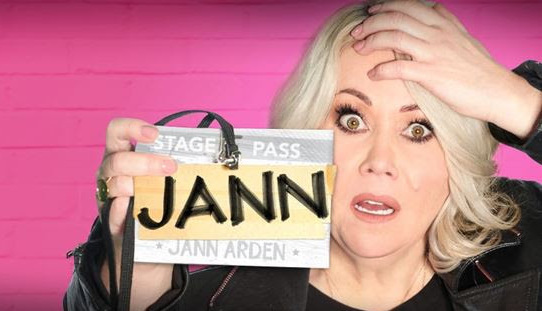TV Interview!

Interview with actors Jemima Rooper, Max Irons, T’Shan Williams, Alana Boden and EP Paul Sciarrotta of “Flowers In the Attic: The Origin” on Lifetime by Suzanne 6/22/22
This was a Lifetime event where we watched the first episode of this series and then asked the actors and executive producer questions. It was unusual that we watched the episode first, live, right before the Q&A. Usually they put the episodes up on their press site for us to watch on our own time. It was nice to chat with these nice people, most of whom are British! The characters they’re playing are all Americans, though. I enjoyed the show and the panel. I hope you like the show! It’s a four-part miniseries that airs every Saturday starting tonight, July 9, on Lifetime.
Here’s the transcript, but it’s not edited yet. Check back to see it!
Please welcome our panelists for today’s Q&A with stars Jemima Rooper, Max Irons, T’Shan Williams, Alana Boden and executive producer Paul Sciarrotta. Hi everyone.
Thank you for being here today. Paul, our first question is for you. You both executive-produced and co-wrote “Flowers in the Attic: The Origin.” We understand that you were in close contact with VC Andrews ghost writer, Andrew Nierman. Can you please tell us a little bit about that process?
Paul: Sure. Yeah. We started about four years ago when the project was brought to me, and I, of course, had read Flowers in the Attic,” you know, maybe a long time ago. and I wasn’t, at the time, even aware there was this prequel book… and when I found out it existed and that Andrew wrote it, I was very excited. So it’s actually the first book that he wrote in the VC catalog…The first of, I think over a hundred, now, that he’s written. So it’s been a valuable resource to have him on speed dial all the time. I would call him, always. I still do for any questions I might have, if I’m ever unsure about story point or if something is totally correct. Or, you know, of the world. I can just check with him, and he has his finger on the pulse of all things VC. So it was…I was very lucky to have him be a part of the project.
Awesome. I will take some questions from the audience. Just a reminder. If you can, please make sure you have your first and last name so I can call upon you correctly. Our first question is from Suzanne at TVMEG.COM. Please unmute yourself to ask your question.
Suzanne: Hey, how are you all? I really enjoyed that. That was a good movie… or, it wasn’t a movie, I know, but it was. Let me ask you, Max: What did you do to prepare yourself for this role of being this horrible, horrible person?
Maxi: Hi, Suzanne. Well, I think for me, firstly, I had to get past the fact that he was horrible quite quickly. I had to look and find why he was the way he was, how he had learned to cope with the world as the world presented itself to him. So, the formative things I think in Malcolm’s life were his mother and father. His mother was the center of his universe was taught him about emotions, about love, about, you know, everything. They coexisted for the first few years of his life almost entirely. And then, all of a sudden, she left, and his father wasn’t around to help him process that or make any sense of that. You know, there was no modern psychology to come to his aid. He had tutors. He was sent away to a boy’s school, and he had to make sense of that. And so he did, and he hardened himself to the world and where his father had been through his, you know, through Malcolm’s understanding headness and not particularly capable. Self-serving Malcolm discovered duty and, and, you know, rigid a rigid work ethic and, you know, uh, where Malcolm had shame, he, he sought to, to, to elevate the Foxworth name and his business and make himself triumphant and powerful. And so, yeah, it was just looking at his younger self and yeah, and, and going from there.
All right. Thank you so much. Thank you. Thank you. Our next question is from my cues. Yeah, this is a question for Elena. Um, this is a really unusual role for you. Um, it’s, it’s not pretty unusual to have a romantic scene with someone who’s 43 years older than you are, but it’s not the cliche kind because you warmly like the man and he warmly liked you.
So it’s, it’s not any kind of cliche. So tell us a little bit about playing it, getting in the mood. And were you really familiar with Kelsey grammar ahead of time? To what extent did this become kind of a, a, a big challenge. Yeah. Um, I mean, Kelsey is absolutely fantastic and he made me feel so comfortable for some of the, some of the scenes, because like there is, there is like that really, um, really big age gap.
Um, But I think in terms of getting prepared, you know, we, we just took some time to, we worked with an intimacy coordinator. We took some time to figure out, um, how we think their relationship would be, how, what we were comfortable with. Um, and yeah, it was, it was actually really, really interesting to sort of work on that.
And, um, you know, I think for me, it’s, it is genuine love between the two of them. So to make sure that was, that was how it, how it was, you know, Perceived as the audience was, was really important. Um, but yeah, it was, yeah, it was really, it was really interesting Dean, like I say, he’s fantastic. And he was, you know, always making sure I was feeling comfortable and, um, just really worked with me and we worked together to hopefully create something that, that comes across really genuine.
Okay. Thanks. Thank you so much. Our next question is from Hanta Smith.
Please unmute yourself to ask your question. Oh, okay. Is there, um, video on here? No video, just audio and we can hear you. Oh, okay. Perfect. Hi everyone. Thank you so much for your time. I’m so excited for everyone and it’s exciting series. I would love to know what was it like, you know, interacting with everyone on set and also what can the viewers expect when watching this awesome series?
Anyone can take that question, right? Uh I’ll I’ll go. I’ll go. I’ll jump in. Um, uh, it was, we shot the series, um, sort of in the height of the pandemic. We all relocated to Romania for four months. Um, and we became, uh, a lovely family, not quite the twisted family of the show. Um, and I think, uh, You know, I, I adored working with every single person on set and, uh, what was amazing is that as we were there after more time, the episode that you’ve just watched is very much just sort of the beginning, but from episode two and three to four, the whole thing opens up the children grow up.
Um, they come into it, um, the, the whole sort of premise six fans and, um, the whole S. Expands. And, uh, that was what it was like for us. Uh, in Romania, we suddenly got this injection of, uh, new minds and hearts and then while we were working and, um, and it was just. You know, gorgeous in, in every respect and despite, you know, how dark some of it gets.
Um, it, it was always a very happy set. I think sometimes when you’re doing things that are a bit darker or a bit more serious, you kind of find the fun a bit more on set. So it’s more enjoyable. Um, I think people are sometimes more miserable during comedy . Um, we had, yeah, we just had, uh, a beautiful time with, uh, a lot of really amazing people and we all just felt really happy to be working at a time.
Uh, it definitely felt like a luxury. Awesome. Thank you so much. thank you so much for your question. Our next question is from Jared Horton.
Hi, can you guys hear me? Yes. I am. Well, first of all, congratulations on the series. I thought it was great. Um, when I’m watching movies and TVs, I’m really big on dialogue and I thought you guys had some great dialogue within the series. I was wondering it was something that you picked up within your character that you took from, um, Um, afterwards in your own personal life, like she made the comment that a mother said forgiveness and revenge.
And I was just wondering, did is anything that you guys picked up far as wisdom or life lessons that you picked up from your character or just in general? Great question. I’ve started doing voiceovers in my everyday life. I now describe everything’s doing I’m going downstairs in the morning. Um, uh, no, I really, um, that’s a great question.
Um, No, I don’t think I, I sort of, sort of hope I haven’t taken anything of Olivia into my day to day life, but I tell you what I was thinking about this earlier today. Um, playing, playing that part, playing that kind of a role, um, playing this character that. I, I feel like it’s very far removed from who I am as a person, but she was so vivid on the page.
Uh, Paul’s writing what he did. Um, I sort of never had any questions as how to play her. And, uh, there’s something about playing Olivia. That for me was incredibly empowering and I sort of feel like that element of it I’ve taken. I hope that’s great. That’s great. Well, I think you did do a great job with the role.
Thanks. Um, I think it’s a great series. I look forward, um, to watching it more and congratulations to you guys, especially pulling it off during the pandemic. I just think you guys did a great job, pulling it off. KU kudos you guys over there. Thank you. Thank you so much. Our next question is from Dominique Clark from Ben worthy media.
Hello, all. Congratulations on this series. I mean, the trailer gave me goosebumps and I’m so excited that we’re finally getting the origin story of the grandmother who locked our children in the attic. Um, Seeing the story through Olivia’s eyes shows how evil isn’t born, it’s made. Right. And specifically for the ladies here, how did Olivia’s transformation throughout this series transform your individual characters?
How did you change as she did? I think, I will say with, um, Nell’s character, I think as she was a, a longstanding staff member at Foxworth hall and was quite used to, as max was saying, like the rigid rules of how it works. Um, I think meeting. Olivia and seeing that she had a bit of bite and spark really kind of opened up their friendship a little bit and it made it grow, which was really quite interesting to discover with Jemima.
Um, yeah, cuz I think, yeah, I think she, her character really like challenges him and um, and yeah, and I think with N working there for so long, um, and I guess. Conforming in, in a way until she kind of meets Olivia. I think it’s, um, I think she definitely, um, like made an impact on her arrival for vanilla.
Thank you. Any other other ladies or folks wanna share? No, that was too
Okay, great. Thank you guys so much. And congratulations again. Thank you our next, oh, thank you so much. Our next questions from Pauls.
All right. Hello? Hello. Thank you so much for being with us today. And, um, congratulations, uh, on this, this is fantastic. Uh, I gotta note because these characters are so different from you personally, um, everything about them, where they’re from, you know, and different time, everything, uh, what kind of Headspace do you have to for each of the actors?
Do you have to put yourself in to, to play these really dark roles? Cool. My personal experience, which may well be very different to the others. So, um, they, they must say as well, um, uh, the, the sort of amount that Olivia had dialogue wise, um, and scene wise, especially sort of at the beginning, it kind of eased up a little as we got into it.
Um, Sort of so full on. Um, I remember I just had to be, I just to get one foot in front of the other and to know my lines and turn up on set was what I could manage at the time. Um, which in a way is really liberating and kind of makes it easier because otherwise you can. Get, I very often get stuck in my own head and think too much about everything.
Um, and sometimes, you know, after the event, you look at things and think, oh, I wish I wish I’d thought about this, or I wish I’d done that differently. Um, but. Such a sort of big undertaking in so many ways is actually in some ways easier and, and, uh, yeah, more, more freeing, more liberating, um, than sometimes not having so far to go with a character.
Um, it’s, you know, I find it easier to be further away from myself, I think, but, and normally I do lots of research, but, uh, in this. I, and I, I think with regards to Malcolm, um, you know, a lot of credit goes to Paul for, for, you know, when, when the writing’s good, it helps those neurons connect sort of effortlessly, and you don’t have to.
To force anything, but sort of, it returns to my first, um, thing I said at the beginning that, you know, when, when you are evil, when a person’s evil, they don’t wander around thinking they’re evil. You know, they, they wander around thinking what they’re doing is right and proper. And just, but I, I do know, um, I spent quite a lot of time in the early days trying to convince people that I wasn’t an asshole.
There was a, there was a picture of me in the production office. You know, all the actors have their faces up in the production office. And my everyone elses was lovely. My picture, I looked like an asshole, like really smug. And then I thought, oh shit, they’ve seen that. Now I’m cast as this, this asshole.
How is your so I, I, I dunno if I can say anyway, I spent a lot of time giving people cups of tea, that sort of thing. And, and trying not to be an asshole. Um, yeah. Yeah. Sorry. Todd was one thing there too. Um, like Jeremiah was saying we had a lot to do in a limited amount of time. And, um, I, I can’t necessarily speak to what everyone did individually creatively to prepare for that, but I certainly can speak for when they showed up, everyone was on point, smiling, prepared, professional, lovely.
Um, and that is, you know, that’s pretty special when that all comes together. So I felt like the lucky recipient of all that on my end. So thank you to you guys. Thank you so much, Paul and max, that was a great answer. And you are allowed to curse here, so it’s okay. oh really? Oh, great. Let’s go away. OK.
Thank you so much. Thanks, Paul. Our next question is from women for the culture.
Please unmute yourself to ask your question. There you go. Okay. Hi. Thank you guys for having me. My name is Natasha and I’m with women for the culture. My question is for, to Sean. Um, I just wanted to ask you, so from the moment we meet your character, Noah, we can tell just by looking in her eyes that she’s compassionate, caring and knows something that everybody doesn’t know right now, especially when we see the scene from your daughter.
But I just wanted to know why do you think black women’s first instinct is to go into protective mold, even when we barely know, um, their person. Well, I think if you think about the time that this is set in, um, it’s a very, very good question. And I found myself asking that question in my process as well.
Um, especially in scenes where I found myself helping, um, Olivia and. Because in some ways, she’s very much the more compass of, of, um, the story when all of this madness is going on. And sometimes I find myself asking that question as well, um, for my process, but, um, I think is she’s a rock for her family and she’s also a very fiercely loyal friend and, um, And I think if, if we look at the time, as I was about to say, if we look at the time that this is set in, it would be very unlikely that her and Olivia would probably even strike up a friendship with one that’s lasting anyway.
So it’s just a, a very specific circumstance that they have kind of built their friendship on. And I guess you’ll see more, more about that when the other episodes come out and more be clear, um, about, um, maybe ask, answer your question more, but, um, yeah, I can say that. She’s got a really good heart, I think.
Yeah. Thank you so much for that answer. And I can’t wait to see Noah’s, uh, story unfold more throughout the series. Thank you. Thank you. Thank you so much. Our next question is from Karen Mo from sci-fi vision. Hi everybody. Um, thanks for doing this. My question is for Paul, I’ll try to keep it short. Um, flowers in the attic has been adapted before.
I think the last time lifetime did so was in 2014 and 15. Um, in the, since then audience standards and industry standards for how you adapt and present some of this really sensitive, uh, material rape incest abuse. Um, Has really changed. And I wonder if you could speak for a minute about your approach and lifetime’s approach and how it may have evolved in the last few years.
Sure. Um, I can’t speak to how their other, um, flowers movies were produced. I wasn’t a part of those back then, but I do know that from the very beginning of my working with them, they were, um, incredibly supportive, incredibly collaborative. Um, and what we had was this, um, this source material. Where so much of the main character story was based on this sexual assault.
And it was a balancing act that I worked with with my, um, my, my producing team in Los Angeles and all the great executives at a and E in lifetime, trying to figure out just how much of that assault do we show and how do we show it. Um, and in order to tell the story best, uh, and I hope we struck. A good balance.
Um, I was very grateful to have such, um, open partners with it. And the other piece of it was Jemma for the, um, on set. We talked, um, a lot with the intimacy quarters and everyone else, but even about certain lines, you remember, we were talking about a line in the fourth movie, um, with Paul Wesley and, and Jemima.
And it was something about how she didn’t wanna, like, I think the line I had written was allow someone to control me again. And we talked a lot about that in that tent of all the mosquitoes. I remember that. Um, we changed the line. Um, and I think it’s that kind of conversation, um, that I hope helped tell Olivia’s story in a thoughtful and sensitive and productive way.
Thank you. Thank you so much. Our next question is from Mr. Dark eye podcast.
Please unmute yourself to ask your question. Thank you. Yes. All right. Can Y. Yes, we, yeah. All right. So my question is for max, um, in your role, like with you having to be evil and, um, you know, play that role so well, what was your inspiration to be so into the character the way you was and how did you really tap in?
Oh God. Um, I, for fear of repeating myself, um, You know, there there’s, there was a few, obviously the cast, uh, helped enormously. Um, you know, also as an actor, when you have wonderful costumes and you have wonderful sets that also helps a great deal. Um, but yeah, I just, I like, like I said, I sort of just had to tune into the, the child inside of Malcolm.
That was the tapping in, uh, and, and, you know, these days we, we are so there’s so much modern. There’s therapy available. There’s psychology and there’s, you know, the way parents work with their children. Now it was these things were unheard of in those days. Um, and we, we take these things for granted, modern parental thinking and, and trauma and post-traumatic stress disorder and all these sorts of things.
Um, Malcolm was just left to figure it out and it didn’t, he didn’t figure it out. He didn’t. Do a good job, but he, he, he did so in a way that enabled him to survive. Um, and that’s how I have to look at Malcolm. Uh, and, and out of that way of thinking comes his evil. And, and that for me is, is a byproduct of that, that interior life think.
Thank you for that. And you did a very convincing job, so that just means you’re good at what you do. thanks. You guys also very kind and put a lot of people on set at ease with his kindness with, with, with that kind of material. Um, and it takes a very special to person to do that. And we had that in that, so, yes.
Oh, thanks. Cool. I’d like to add as well that, um, I know probably a lot. Male actors who would just a approach it as is wouldn’t, wouldn’t struggle playing this sort of a role would probably quite enjoy it. And max is, you know, the opposite of Malcolm. He is, um, such a lovely person. And for him to get to those places was a struggle.
And the struggle is what makes the character more interesting and more layered. And so it’s only better for that. I. I agree. Nice guys go. This is nice. Thank you so much for your question. Our next question is from Towanda Blake.
Hi. Um, my question is what was it like filming inside of a, the pandemic? And did, do you think that offered you more? I’d say it stretched you more to bring perfection to your characters.
Yes, I think, uh, in a way it did, it was this sort of quite surreal bubble. Um, I think for us all to be away from home for as long as we were, um, normally people, if you are filming, you know, outside of home, you are in and out or, um, You’re not really with each other. And it was such a shared experience, the whole thing, onset and offset, and, uh, Yeah, I think there was such a, a lovely feeling because you did, everyone felt really grateful and really privileged to be working.
And it was also really interesting work and everyone really looked out for each other, the, the credo all the way through the crew from the top to the bottom, um, it, it felt very collaborative and very supportive. And I think that’s quite rare to that extent. And, um, and that made. Very special. Um, it wasn’t just another job, I think.
Thank you. Awesome. Thank you. We have time for one more. Our last questions from Aries, urban bridges.
Hi, everybody. I’m gonna echo everybody else. You guys did a great job. I love the movie. I’m gonna address my question to Taan. Besides it being an epic book. First, what made you want to be a part of this role and play Nella and flowers on the. Oh, because, because she’s not part of the books because, because I could, because I could, um, Paul really gave me the reigns to like build on her from the ground up and I kind of just got to implement her story, um, where it wasn’t there before.
And, um, yeah, so I just got to bring this completely fresh character to such a huge franchise of, of a book. Um, Book series and I just, and I thought her character was really interesting, um, and layered and, um, Yeah. And quite exciting and important as well to the story. Yeah. Um, as I said, like her being, um, like the moral compass of, of the story for a lot of the, a lot of this, um, episodes, um, and her family, which you’ll get to meet in the other episodes and, and yeah, you get to see a bit more of her when you see her family as well.
And that’s all really exciting and they’re all brilliant actors as well. And yeah, so it, I mean, it. It wasn’t hard. That’s, that’s an easy, it wasn’t very hard. yeah, it makes a lot of sense, but you brought the character. Great job again. Continued success. Thank you. Thank you so much. Thank you everyone for such great questions.
Thank you to our panelists. You guys were amazing as always. And thank you all for joining today’s advanced screening of part one. If we did not get to your question, I know we dropped this in the chat as well.
MORE INFO:
Official Site and Preview
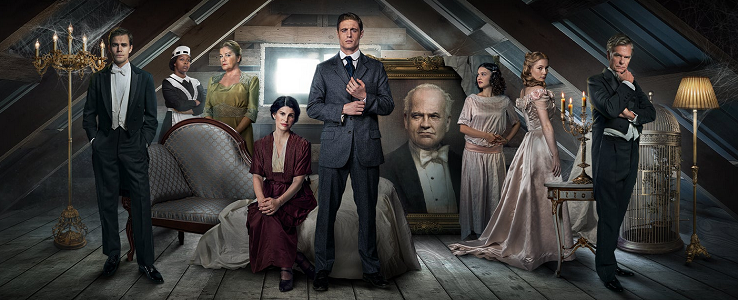
Flowers in the Attic: The Origin tells the story of the headstrong and determined Olivia Winfield (Rooper) who is working alongside her beloved father (Hamlin) when she finds herself unexpectedly wooed by one of the nation’s most eligible bachelors, Malcom Foxworth (Irons). After a whirlwind romance, Olivia finds herself as the mistress of the imposing Foxworth Hall, where she soon discovers that the fairytale life she expected has quickly become a nightmare. Under Malcolm’s debonair exterior lies a dark heart, and a twisted evil lurks inside Foxworth Hall that will threaten Olivia’s happiness and that of her children. Her attempts to keep them all safe ultimately push Olivia to become to most terrifying version of herself, leading to her inevitable—and notorious—decision to lock her grandchildren in the attic…
Dodd stars as Olivia’s daughter, Corinne; while Williams takes on the role Foxworth Hall’s longtime staff member and Olivia’s observant housekeeper, Nella. Mulgrew plays Mrs. Steiner, Malcom’s loyal house manager and head of the Foxworth Hall staff. Grammer portrays Malcom’s illustrious father Garland Foxworth, who is married to new wife Alicia, played by Boden. Wesley stars as John Amos, Olivia’s cousin whose revelations change her life forever and Callum Kerr stars as Christopher, a close relative of the Foxworth family whose life will be eternally intertwined with Corrine’s from the moment they set eyes on each other.
Additional talent starring in the four-part miniseries event includes Luke Fetherston, Buck Braithwaite, Jordan Peters, Evelyn Miller, Rawdat Quadri, Emmanuel Ogunjinmi, David Witts, Carla Woodcock and Peter Bramhill.
Flowers in the Attic: The Origin is an A+E Studios production in association with Sutton St. Productions and CBS Studios. Paul Sciarrotta serves as executive producer. Jennie Snyder Urman and Joanna Klein serve as executive producers for Sutton St. Productions and CBS Studios. Zoë Rocha serves as executive producer for RubyRock Pictures, Gary Pearl executive produces for Aquarius Content and Dan Angel executive produces. Declan O’Dwyer also executive produces and directed part one and part two of the miniseries. Robin Sheppard serves as director for parts three and four. Scripts are from executive producer Paul Sciarrotta, as well as Amy Rardin and Conner Good. Flowers in the Attic: The Origin is based on the prequel novel, Garden of Shadows by Andrew Neiderman. The miniseries was made with support of the Romanian Government.
YouTube Preview
Proofread and Edited by Brenda
Back to the Primetime Articles and Interviews Page
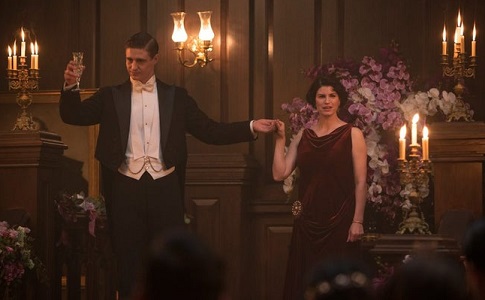
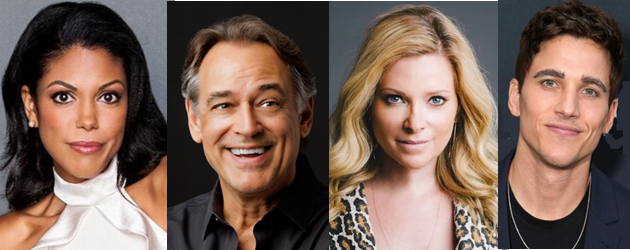
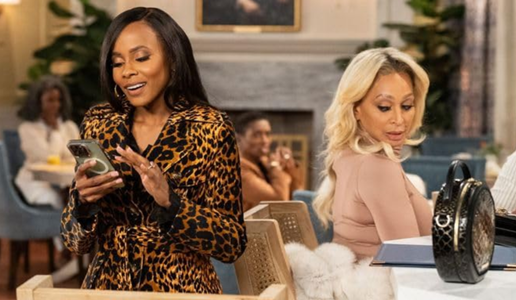
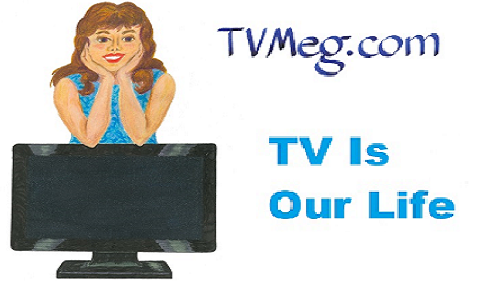











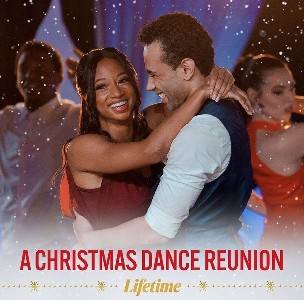 A Christmas Dance Reunion
A Christmas Dance Reunion


